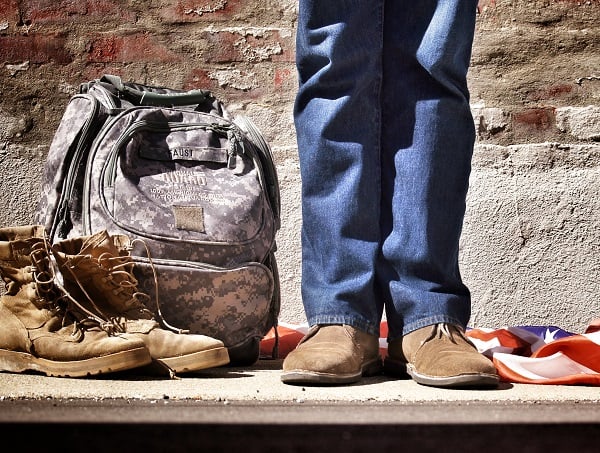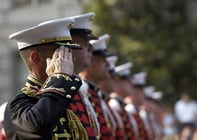Published on
What It Takes to Make “Military-Friendly” A Reality

More and more students are enrolling in higher education from the military, whether they’re still serving their country or have attained veteran status. While these learners face a number of the same barriers to success as other non-traditional learners, they have a unique set of experiences and hurdles other students simply don’t face, and that institutions must recognize in order to serve this demographic well. In this interview, Beth Brunk-Chavez and Nadia Munoz reflect on what it means for an institution to be truly military-friendly and share some insights into how they have implemented this culture at their own institution.
The EvoLLLution (Evo): What are a few key characteristics that need to be in place for a college or university to be a truly “military-friendly” organization?
Beth Brunk-Chavez and Nadia Munoz (BBC/NM): Military-friendly colleges and universities need to identify staff and departments that can articulate and support the needs of military-affiliated students’ transitions into a college-environment, whether they take their courses on campus, online, or both.
In the military, there is a process and procedure for every detail provided to service members. However, the campus culture expects students to obtain information and progress independently. Resources such as a Counseling Center, Career Center, and academic advisors should be prepared to meet the needs and capitalize on the strengths military-students bring to their college experiences.
Ultimately, these resources should coordinate to provide a strong network that can support their persistence and success.
Evo: Though they tend to be lumped into the same category, how do the needs of active-duty students differ from those of veteran students?
BBC/NM: Active-duty students are individuals who continuously serve in the military. These service members have the challenge of balancing their military service with their coursework. They may move several times throughout their education and might even deploy. Also, active-duty service members need flexible course offerings such as online, after-duty hours, and courses taught on the military installation.
Veterans have separated from the military and often have their education as the primary focus. They depend on resources such as financial assistance, transition guidance, and job placement to be successful.
Evo: When it comes to putting that into practice, how have you and your colleagues at UTEP worked to create a military-friendly environment?
BBC/NM: UTEP Connect provides military students stationed near and far with the opportunity to complete a degree online from start to finish. We offer degrees that are of interest to military students—bachelor’s degrees in nursing, security studies and criminal justice for example. We also offer a degree called Multidisciplinary Studies that enables students to maximize their transfer credits from other institutions. The UTEP Connect Contact Center offers enrollment counseling to assist students from determining if online learning is right for them until they apply for admission. We also offer high-touch advising that is focused not just on enrolling students in their courses but also on helping them succeed.
For both online and face-to-face students, UTEP has a Military Student Success Center (MSSC) with staff dedicated to assisting incoming and current military populations. The MSSC assists with their federal and state education benefits, and direct them to available resources at UTEP or in the community. We work with other UTEP departments to raise awareness of programs or opportunities to enhance the military-affiliated student’s time at the institution.
The MSSC also provides faculty and staff with the opportunity to learn more about military-affiliated students at UTEP and how to help them succeed. Miner Green Zone is offered as informative sessions that discuss the challenges that military-affiliated student must overcome through their transition into a college atmosphere. Those who attend the training are provided with a Green Zone logo that can be displayed in their work areas so that military-affiliated student can identify and gain trust with those campus employees. Those faculty and staff who have attended Green Zone training are equipped with tools and resources that will help UTEP military-affiliated students be successful.
Evo: How do technology tools help to create a welcoming and supportive environment for active military and veteran students?
BBC/NM: Educational technology that supports student success is essential to military-affiliated students. Of course, the flexibility that online classes offer is important. Additional examples of technology resources that are significant to a military/veteran student’s success are a writing center that can provide online consultations by appointment as well as remote access to the university library that offers a robust holding of electronic resources.
Additional resources that are critical to maintain open lines of communication include welcome videos, online orientations, an up-to-date website, and emails with important information such as enrollment status and upcoming deadlines. The MSSC has developed an effective communication method through the institution’s Customer Relationship Management tool, or CRM. Currently there are over 3,000 military-affiliated students who receive direct information via emails from the MSSC on upcoming events, programs, community resources and education benefit information. The enhanced communication has been extremely positive as many students do not identify or seek out information with any other department. As soon as military- affiliated students identifies themselves in their enrollment application or attend their Orientation, this will begin their CRM engagement. The CRM tool has created effective communication between the department and the student.
Some other areas worth exploring are also webinars, and interactive chats that a department can have with military/veteran students. Faculty and staff can develop an online professional development course to help instructors understand military culture and the challenges that military students face.
Evo: What are the negative ramifications—for both military students and higher education institutions—when colleges and universities use the “military-friendly” language while falling short of that promise?
BBC/NM: Falling short of this promise would create a culture of mistrust by the military. They would not trust the university for anything else and hesitate to work with the other universities who make such claims. Military and veteran students would choose to go to other institutions who would support them in their needs.
Author Perspective: Administrator


